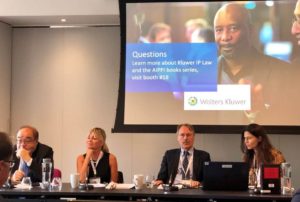 London’s weather was very generous to AIPPI participants this year. It was not so hard to get up early and attend the breakfast panel on Genuine Use of trademarks organized by Wolters Kluwer as part of the 2019 AIPPI World Congress in London.
London’s weather was very generous to AIPPI participants this year. It was not so hard to get up early and attend the breakfast panel on Genuine Use of trademarks organized by Wolters Kluwer as part of the 2019 AIPPI World Congress in London.
The panel was moderated by Eléonore Gaspar (DTMV, France). Eléonore presented the topic and noticed that national courts and laws do not always assess in the same way the issue of trademark use. The panel focused on trademark use issues from Canadian, European and Singaporean perspective.
Paula Clancy (Clancy, Canada) introduced two key changes of Canadian Trademarks Act that came into force on June 17, 2019. Pursuant to the first one, there is presumption of intention to use or prior use of trademark in Canada and there is no need to claim a filing basis. Registration is automatic upon expiry of opposition period, whether or not a mark has been used in Canada or abroad. Moreover, the requirement to file a declaration of use was abandoned. Despite of the amendments, Canada is still a use-based jurisdiction where priority of rights is based on use and it is necessary to use trademark to establish and maintain trademark rights. Paula Clancy explained what qualifies as genuine use in Canada. She underlined that it is important that trademark is marked on goods. The genuine use in Canada must be proven when facing cancellation/invalidation proceedings and opposition proceedings. Moreover, if one wants to enforce the trademark that has been registered less then 3 years before filing claim, he must file proof of use. A non-used trademark may be cancelled and is more vulnerable for invalidation on basis of abandonment. There is no requirement to maintain absolute identity of mark, but dominant features of mark must be preserved. She presented examples of interesting Canadian case law on genuine use.
Based on Singaporean case law, Stanley Lai (Allen & Gledhill, Singapore) noticed that genuine use means bona fide use as a trademark. It is important to prove use in opposition proceedings to support application/opposition or to prove well-known character of trademark. Right-holder have to prove genuine use in revocation proceedings based on non-use and as a defense in infringement proceeding. Stanlay Lai noticed the five year grace period following the date of completion of the registration procedure and the consequences of non-use that is revocation of the trademark. The regulation on use of the trademark in a different form than registered is very similar to European one. The Singaporean trademark act is very similar to European regulation.
Prof. Alexander von Mühlendahl (Bardehle Pagenberg, Germany) focused on European Union trademark regulations. When talking about sanctions of non-use, he underlined the defense in opposition or cancellation based on earlier right and in infringement proceedings. He noticed the risk of revocation of the trademark on non-use grounds and mentioned the protection of intervening rights. Use must begin at the latest five years after date of registration and must not be interrupted for more than five years. He presented the calculation of this five year period in different trademark proceedings and put attention on the issue of broad specification and partial use of trademark as well as on use of a mark which differs from mark as registered.
Questions from the audience referred inter alia to use of the trademark in advertisement. Paula Clancy noticed that use of trademark in advertisement is insufficient to constitute genuine use for goods in Canada as the trademark must be put on goods, but it is sufficient for the services. As to EU, the right-holder need to introduce goods to the market, however pre-use advertising in grace period shall support use. One of the questions referred to use of the EU trademark in UK after Brexit. The answer was that use of EU trademarks in UK after Brexit shall not be treated as genuine use.
As the panel touched the essence of the trade mark right, there was a lot of discussion afterwards. The number of participants shows that genuine use of trademark is important topic.
_____________________________
To make sure you do not miss out on regular updates from the Kluwer Trademark Blog, please subscribe here.


